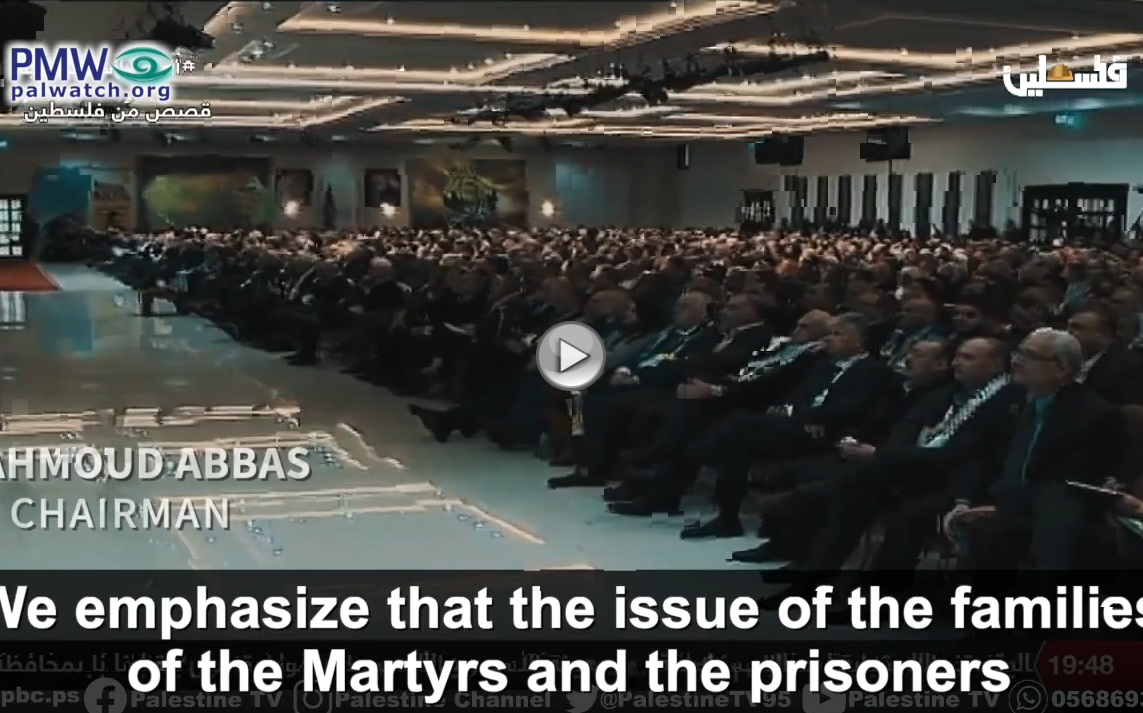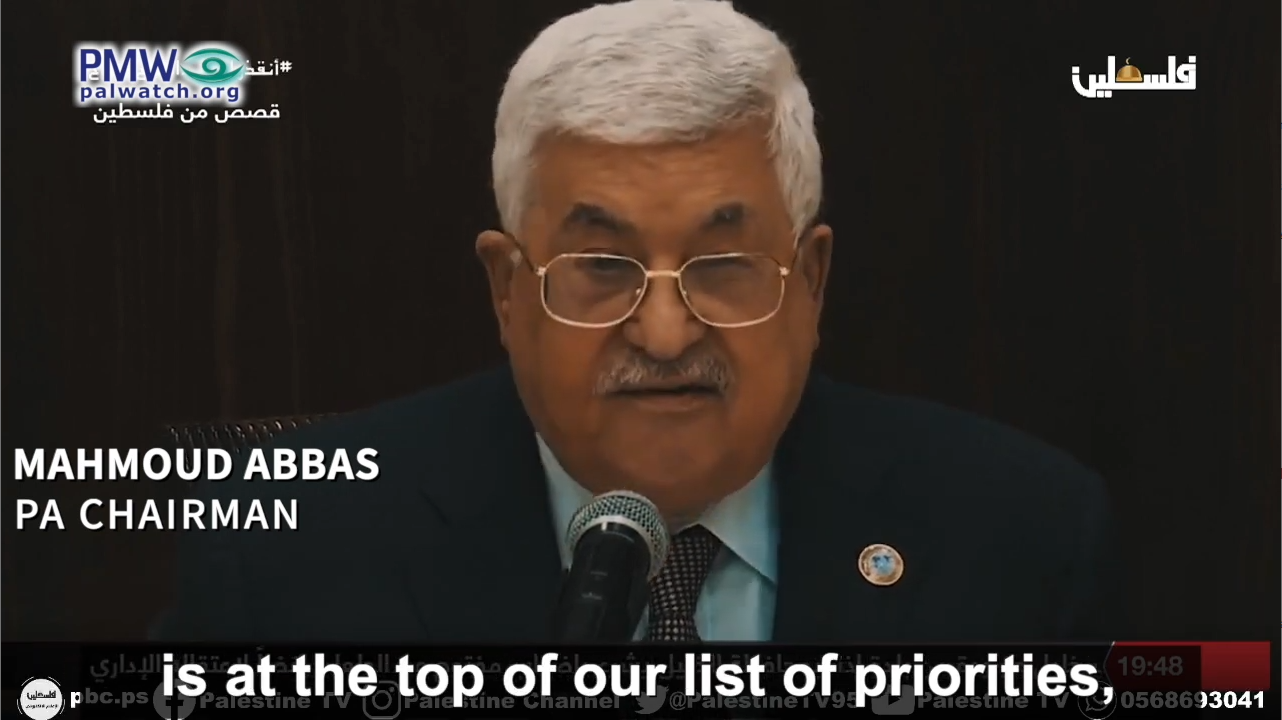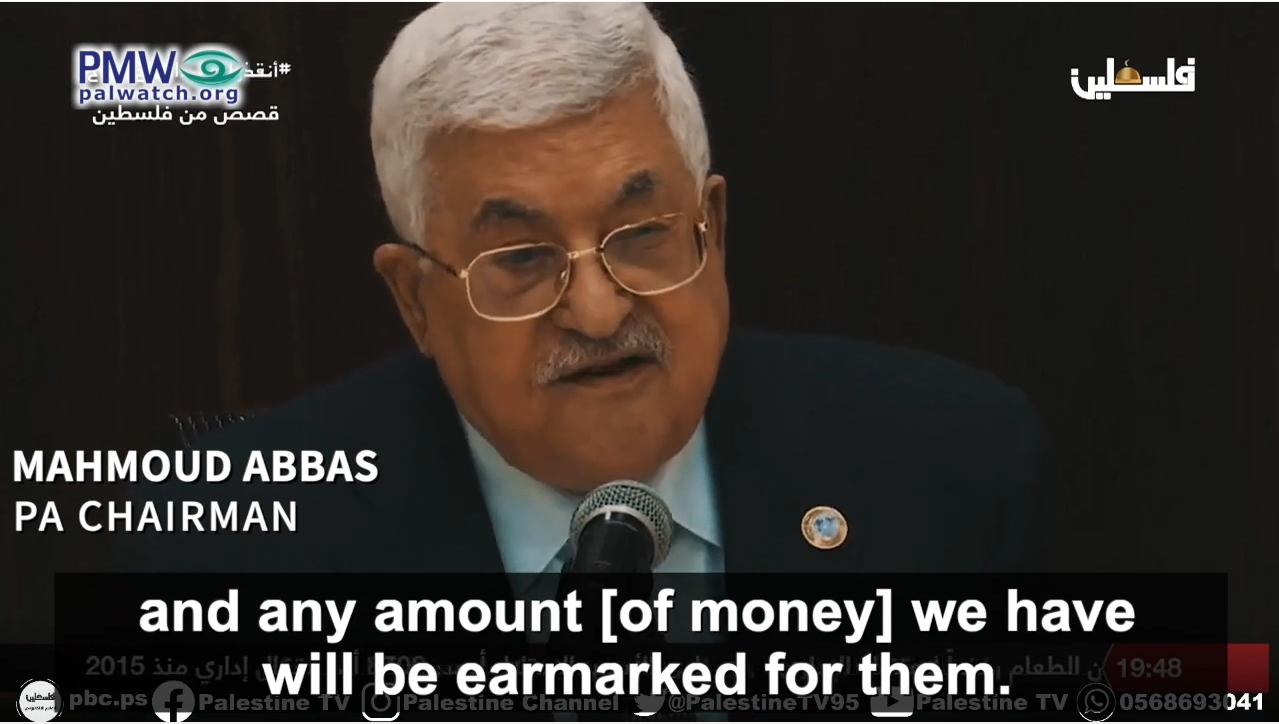Why is the Palestinian Authority not paying its employees their full wages?
The Palestinian Authority is once again complaining about its alleged financial crisis. As a consequence of the alleged crisis, for months the PA has only paid its employees 70% - 80% of the salaries due to them. As usual, the PA is deflecting any responsibility for its situation and is merely blaming Israel.
This approach was summed up in a statement of PA Prime Minister Muhammad Shtayyeh following the July 31, 2022 decision of Israel’s Security Cabinet to implement Israel’s Anti-Pay-for-Slay Law that withholds tax money from the PA by the amount the PA pays in salaries to terrorists.
“The Israeli government’s decision to deduct a sum of 600 million [Israeli] shekels from the Palestinian tax money is arbitrary and illegal. He noted that this is tantamount to piracy that will add another dimension to our financial crisis, but said that this will not dissuade us from standing by our commitments towards the families of the prisoners and the Martyrs.”
[Official PA daily Al-Hayat Al-Jadida, Aug. 2, 2022]
For the purpose of analysis, Shtayyeh’s statement should be broken into three parts.
Part I: Israel’s decision was neither “arbitrary” nor “illegal”
In the decision, the Israeli Security Cabinet approved a report of Israel’s Minister of Defense, which stipulated that in 2021 the PA had spent approximately 600 million shekels paying salaries to terrorist prisoners and released terrorists and allowances to wounded terrorists and the families of dead terrorists. These payments are often referred to as the PA’s Pay-for-Slay policy. According to Israel's Anti-Pay-for-Slay Law, the figure stipulated is now being deducted in twelve equal parts from the taxes Israel collects and transfers to the PA.
The decision was neither arbitrary nor illegal. Israel gathers taxes and transfers them to the PA as part of the Oslo peace agreements. These are not PA taxes, as the Palestinians often claim, but rather Israeli taxes waived in favor of the PA. The taxes are not given as a free gift. Rather, the expectation is that in the same manner as Israel collects and transfers the taxes pursuant to the Oslo Accords, the PA will meet its commitments pursuant to the Oslo Accords, inter alia, to combat terror.
But instead of using the money as intended, the PA uses the money to incentivize, promote, and reward terror through the terror salaries. The PA’s refusal to abandon its Pay-for-Slay policy has therefore forced Israel to legislate a law that penalizes the PA for these payments.
According to Israel's Anti-Pay-for-Slay Law, at the end of each year Israel’s Minister of Finance submits a report to the Israeli Security Cabinet, in which he details the sums paid by the PA (directly or indirectly through the PLO) to the terrorists. Once the report is approved, the sum set by the Minister of Defense in his report is then “frozen”.
The frozen money is deposited in a special account. The law adds that were the PA to abandon its terror reward payments, it would be entitled to receive some, if not all, of the money withheld.
Part II: Is the PA suffering a financial crisis because of Israel’s decision?
Analysis of PA financial reports, actually shows that in the first half of 2022, the PA’s gross revenue from all taxes – the taxes Israel collects and the taxes the PA collects by itself – was higher than ever. When compared to the same period in previous years, the PA revenue for the first half of 2022 has risen by over 1.3 billion shekels compared to 2017. 900 million shekels of that rise is from the taxes Israel collects and transfers to the PA.
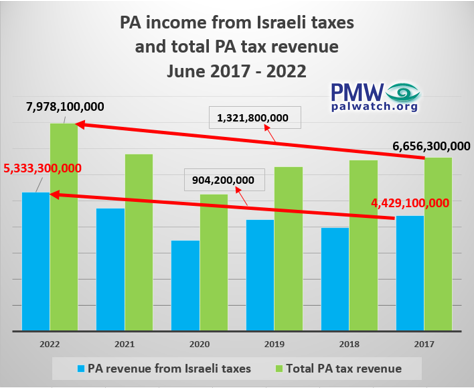
According to the PA’s financial reports, by the end of June the PA tax revenue was higher than expected and already covered 52% of the PA’s 2022 budget.
While the PA has been taking active measures since the beginning of 2022 to hide its budget performance reports, Palestinian Media Watch managed to get access to the June 2022 report, which is being exposed here, for the first time:

Even if one were to look only at the PA revenue from the Israeli taxes, after the implementation of the Anti-Pay-for-Slay Law the picture does not change substantially. According to the PA financial reports, the PA income from the Israeli taxes during the first six months of 2022 was the highest ever, and greater by over 165 million shekels, even after taking the Israeli deduction into account.
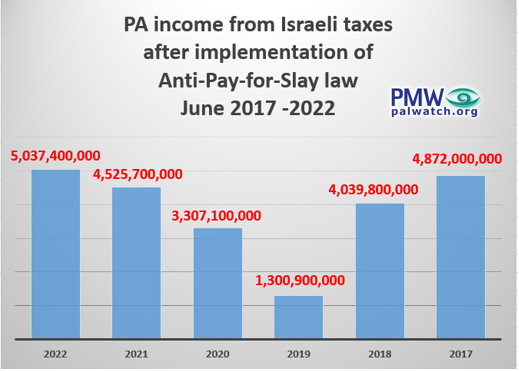
A closer look at the PA’s multi-year revenue compared to its multi-year expenditure on wages and salaries for the PA employees exposes a similar reality. While PA revenues have jumped, as noted above, by over 1,321,800,000 shekels, since 2017, the PA expenditure on wages and salaries to its employees has only grown by 50,989,360 shekels.
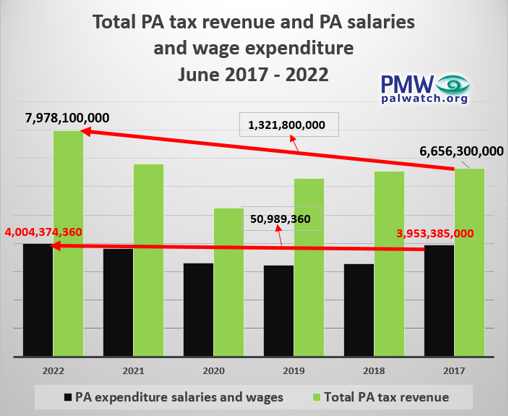
Moreover, on Sept. 5, 2022, the European Union announced that it had provided the PA with a contribution of €35 million to help it “pay the August salaries and pensions of its civil servants, mostly in the health and education sector in the West Bank.” [Website of the office of the European Union Representative (West Bank and Gaza Strip, UNRWA), Sept. 5, 2022]
In other words, while Shtayyeh blames Israel for the PA’s alleged financial crisis, the PA’s own financial reports show that the first half of 2022 has been a record year for PA tax revenues. Those same records show that the PA income from the taxes collected by Israel has grown by 20.4% in just six years. In addition, the PA is once again enjoying substantial contributions from the European Union.
So why is the PA apparently short of cash?
Part III: The PA’s dogmatic adherence to its Pay-for-Slay policy
While the flow of taxes from Israel to the PA has consistently grown, the aid the PA has received from the international community has consistently shrunk. In fact, primarily in response to PMW's exposing the PA’s Pay-for-Slay policy in 2011, the PA’s income from foreign aid has plummeted by 90%.
While willing to provide aid to the Palestinians, the international community, with the exception of the EU, is mostly unwilling to support the PA’s terror reward policy. After the policy was exposed, some countries made administrative decisions to curtail their aid to the PA while others passed legislation.
In the US, the 2018 Taylor Force Act conditioned the bulk of US aid to the PA on the abolition of the policy. In 2019, after presentations by PMW’s director Itamar Marcus, the both the Dutch and Australian Governments announced that it will no longer provide aid to the PA.
Were the PA to abandon its terror rewarding policy it would gain three-fold: Firstly, it would save itself the more than 600 million shekels that it pays to the terrorists. Secondly, Israel would not be forced to implement its anti-Pay-for-Slay law, and the sum the PA saved itself by not paying the terror payments would be doubled. Finally, the PA would again be able to enjoy hundreds of millions of dollars of additional international aid.
But instead of abolishing the terror payments, the PA has turned them into the PA’s highest priority, as PA Chairman Mahmoud Abbas has repeatedly emphasized:
Abbas: “We emphasize that the issue of the families of the Martyrs and the prisoners is at the top of our list of priorities, and any amount [of money] we have will be earmarked for them.”
[Official PA TV, March 5, 2022]
Abbas: “We are dedicating all attention to the topic of the prisoners. Even if we are left with just one penny, we will pay it to those heroes… as they are our people’s most important cause.”
[Official PA daily Al-Hayat Al-Jadida, Feb. 8, 2022]
As PMW has shown here, here, here, and here (to note just a few) these statements by Abbas and Shtayyeh (above) in support of salaries for terror are not a one-off statement, but rather expressions of the PA’s real priorities.
If the PA is suffering from a financial crisis, it is not because of any action taken by Israel. Rather it is entirely due to the PA’s insistence on incentivizing and rewarding terror against Israel.
As the financial reports clearly show, the PA decision to cut the wages it pays to its employees, is not due to actions taken by Israel. Rather, the decision is another manifestation of the PA’s warped priorities to spend its money, first and foremost, on incentivizing and rewarding terror, even to the detriment of its legitimate employees.
The following are additional excerpts from the PA’s budget performance reports for June 2017, June 2018, June 2019, June 2020, and June 2021:





